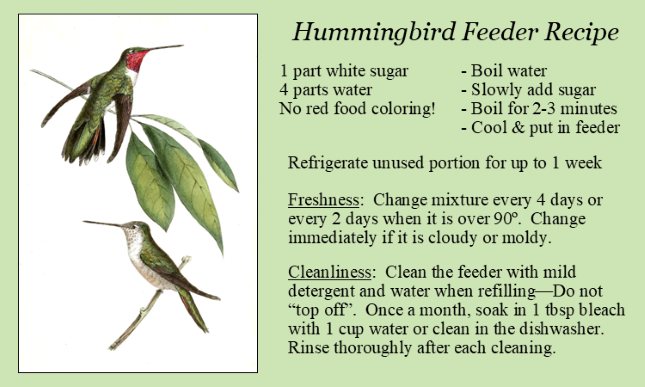By Kim Strader
Hummingbirds are amazing little birds! They weigh no more than a postage stamp, yet fly at speeds of 30 mph. Hummingbirds can reach speeds of 50 mph when diving and an incredible 63 mph when escaping from harm. Their little wings beat at 53 times per second so it is no wonder that hummingbirds need to feed every 15 minutes.
Many of us enjoy attracting these delightful garden visitors and providing them a meal by putting out feeders filled with sugar water. Here is a recipe with reminders about food freshness and feeder cleanliness:

Kim Strader, Naturing Way LLC
Another way we can help fuel these amazing little birds is by using native plants in our landscape. By planting a variety of trees, shrubs, vines, and perennials with tubular, bell-, or funnel-shaped flowers, you can provide a food source throughout the season. Contrary to popular belief, hummingbirds sip nectar from nectar-producing flowers of any color, not just red ones. They also sip juice from fruit and sap from trees. In fact, hummingbirds are known to follow the hole-drilling sapsuckers in more northern summer climes and drink from the “sap wells” they create.
Adding these Virginia native plants to your garden is sure to please the hummingbirds’ needs: Virginia Native Plants to Attract Hummingbirds
Sugary sweet nectar makes up less than 20 to 40% of the hummingbirds’ diet. The remaining 60 to 80% is from protein in the form of bugs – ants, aphids, fruit flies, mites, mosquitos, fungus gnats, and their favorite, spiders. A diversity of native plant species is the best way to attract as many insects as possible. Allowing insects to thrive in your landscape is important not only for hummingbirds but for all species of birds (as well as the troubled insect populations themselves), so eliminate the use of pesticides or insecticides.
Happy Planting and Hummingbird Watching!
References:
BirdWatcher’s Digest article – “What do Hummingbirds Eat?”
Choose Natives article – “How to Feed a Hummingbird: Part I – Insects & Protein”
Cornell Lab All About Birds article – “Not All Sweetness and Light: The Real Diet of Hummingbirds
University of California Bug Squad article – “What You May Not Know About Hummingbirds”

